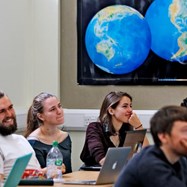Response to OfS digital teaching and learning consultation
14 October 2020
We welcome the opportunity to respond to this review by the OfS into digital teaching and learning during the Covid-19 pandemic. This response builds on our engagement with Sir Michael Barber and his team as they have undertaken their research in this area.
In response to Covid-19, Russell Group universities swiftly changed how courses are delivered. They have worked to make sure students can:
- access digital course materials
- access the equipment they needed (such as through Cambridge's digital gateway grants)
- develop online-specific study skills (such as LSE's digital skills lab)
- undertake virtual assessments
- attend virtual open days
- get pastoral support and advice online
- benefit from a combination of synchronous and asynchronous learning, with live lectures that created a sense of togetherness, and online resources that could be revisited at a later date
- use subtitles or interpreters
- stay safe online (see Bristol's online guidance)
In many cases, universities have produced guidance on these topics and shared them publicly. Our universities have also incorporated online tools to enhance the blended learning experience and have innovated, building on their expertise. For example, through:
- Using virtual learning environments and software such as Moodle, Padlet and Mentimeter to encourage engagement and peer-to-peer interaction
- Using mixed reality experiences (virtual reality and augmented reality) to enhance their blended learning offering (see Imperial's immersive technology initiative)
- Incorporating practical learning methods into virtual learning, by creating experiments and portable labs (such as Exeter's use of Labster and Imperial's 'lab in a box')
Russell Group universities are continually monitoring and evaluating these approaches, surveying students, and improving their online offering not only in teaching but also in pastoral support, inclusion and wellbeing.
There have also been challenges such as the upfront cost of delivering many new online initiatives simultaneously, and the level of broadband infrastructure needed to deliver it. We would welcome further engagement with the OfS, the Department for Education and others in the sector to share best practice and identify areas where we can work in collaboration for the benefit of students.
Read the full response below:
Response to OfS digital teaching and learning consultation
-
Hamir Patel
hamir.patel@russellgroup.ac.uk
020 3816 1316
-
Jamie Roberts
Jamie.Roberts@russellgroup.ac.uk
020 3816 1309
 X
X


